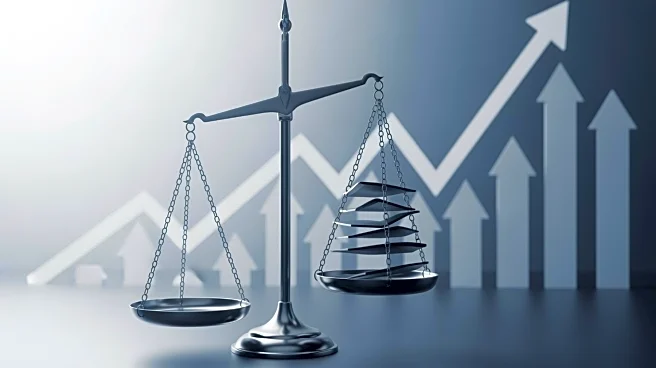What's Happening?
Diane Swonk, a veteran economist, has raised concerns about the current state of the U.S. economy, highlighting a growing disparity between affluent and lower-income households. Despite a slower-than-expected
rise in inflation, the consumer price index (CPI) has reached its highest level since January, driven by increased energy costs. Swonk points out that while affluent households continue to spend on luxury goods and services, lower- and middle-income consumers are struggling, leading to a 'K shaped economy.' This economic divide is causing retailers to notice a shift, with discount chains attracting higher-income shoppers. Swonk also notes that the Bureau of Labor Statistics is operating with reduced staff, leading to a reliance on estimated data, which may not accurately reflect real-world price volatility.
Why It's Important?
The economic disparity highlighted by Swonk underscores a significant challenge for policymakers and businesses. The 'K shaped economy' suggests that while some sectors may thrive, others could face prolonged difficulties, affecting overall economic stability. The reliance on estimated data due to staffing shortages at the Bureau of Labor Statistics could lead to misinformed policy decisions, potentially exacerbating economic issues. This situation could impact consumer confidence and spending, particularly as the holiday season approaches, which is crucial for retail businesses. The economic divide may also influence political discourse, as policymakers grapple with addressing the needs of different economic groups.
What's Next?
As the economy heads into the fourth quarter, Swonk anticipates a dramatic slowdown, compounded by the recent government shutdown that affected federal workers' paychecks. The upcoming holiday season may see uneven effects across sectors, with consumers prioritizing cash over spending, reflecting financial anxiety. Policymakers and businesses will need to navigate these challenges carefully, considering potential tariff-related price pressures and consumer stress. The Federal Reserve's upcoming decisions on interest rates will be closely watched, as they could influence economic conditions further.
Beyond the Headlines
The current economic situation raises questions about the long-term implications of data reliability and economic measurement. The erosion of trust in official data could have lasting effects on public perception and policy effectiveness. Additionally, the economic divide may lead to increased calls for policy interventions aimed at addressing income inequality and supporting lower-income households. The situation also highlights the importance of accurate data collection and analysis in shaping effective economic policies.











